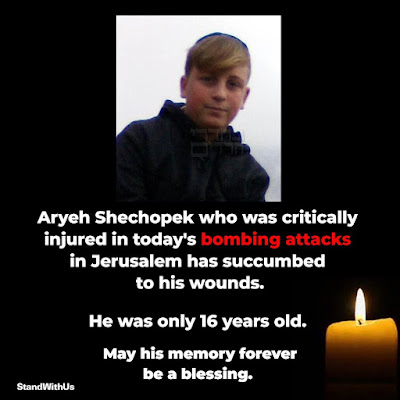Israeli teen killed as terror bombings target 2 bus stops at entrances to Jerusalem
Two explosions at two bus stops near entrances to Jerusalem on Wednesday morning killed one person and left another 22 people injured, police and medics said.Deadly ‘high quality’ Jerusalem bombs planted by organized terror cell, police say
Police described the explosions as a terror bombing attack.
The first explosion occurred close to the main entrance of Jerusalem in Givat Shaul, shortly after 7 a.m., peak commuter hour.
Eighteen people at the bus stop were injured in the blast, including two critically and two seriously, medical officials said. The victims were taken to two hospitals in Jerusalem.
One of the victims injured in the first blast later died at Shaare Zedek Medical Center, hospital officials said. He was named as 16-year-old Aryeh Schupak, a yeshiva student from Jerusalem’s Har Nof neighborhood, and a dual Israeli-Canadian national.
A second blast occurred shortly after 7:30 a.m., at Ramot junction, another entrance to Jerusalem.
Five people lightly hurt by shrapnel or suffered from anxiety in the second explosion were taken to the Hadassah Mount Scopus Medical Center, hospital officials said.
A bus at the station was damaged by the explosion. It was unclear if the victims were at the station or on the bus itself.
A senior officer said police were hunting for an organized terror cell that detonated two “high quality” explosive devices at two bus stops near entrances to Jerusalem on Wednesday morning, killing one and wounding more than 20 others.‘We saw people running, children crying’: Witnesses describe J’lem attack aftermath
Speaking to reporters, the head of the police operations division said the “two high-quality, powerful explosive devices with a high level of damage” were hidden behind the bus stop and in a bush.
The first explosion occurred close to the main entrance of Jerusalem in Givat Shaul, shortly after 7 a.m., peak commuter hour. The second blast occurred shortly after 7:30 a.m., at Ramot junction, another entrance to Jerusalem.
A 16-year-old yeshiva student, Aryeh Schupak, was killed and 22 people were hurt in the two attacks, including one listed as critical and another three in serious-moderate condition, according to medical officials.
Schupak, who was killed in the first bombing, was a Canadian national as well as an Israeli citizen, according to Canada’s ambassador to Israel.
The remotely detonated devices were packed with nails to maximize casualties, according to police officials.
Due to the nature of the attack with two near-identical bombs exploding within half an hour of each other at two bus stops, Deputy Commissioner Sigal Bar Zvi said police suspected an organized cell was behind it, rather than just one person.
“I believe we will capture the terror cell,” she said.
Victims and witnesses described the terrifying moment they were caught up in the twin bomb attacks at Jerusalem bus stops on Wednesday morning.
Aryeh Schupak, 16, was killed, and at least 20 injured in the two blasts at entrances to the city.
Many of those caught up in the terror were children and teens on their way to school.
The first explosion hit a bus stop at the entrance to the city at around 7:05 a.m., and barely half an hour later another bomb went off at another stop near the Ramot neighborhood in the northwest of the capital.
Shahar Sorkis and Neta Varshavski, both 14-year-olds who attend a school in Ramot, saw the second explosion as they traveled with other schoolkids on a nearby bus.
“We saw loads of shrapnel flying off the bus… it was a mess,” Varshavski told the Ynet news site. “We heard a noise and then we saw a lot of people running, a lot of children crying.”
“When we saw the explosion a lot of the girls began to cry. There was a lot of stress,” Sorkis added. Police and security personnel at the scene of a terror attack in Jerusalem, on November 23, 2022. (Olivier Fitoussil/Flash90)
The explosion damaged a No. 67 bus that was passing at the time. The driver, Motti Gabay, told Ynet that he quickly realized it was a terror attack.
“There was panic,” he said.
Gabay, who has been a bus driver for 23 years, including the period of the Second Intifada in the early 2000s when Palestinian terrorists frequently targeted buses with bombs, said he had expected that such attacks would one day return.
“First of all, I opened the doors and people got off,” he said, noting that Israelis “are used to this already.”




















.jpg)




